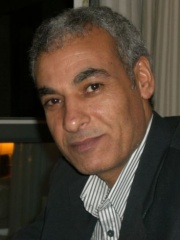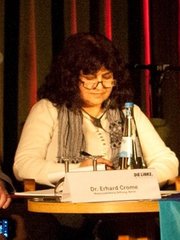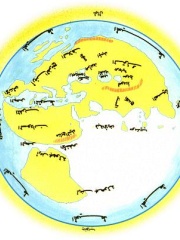
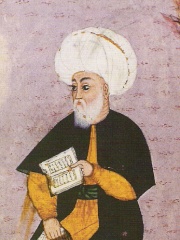
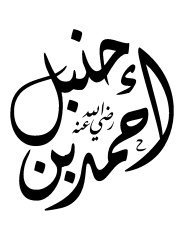
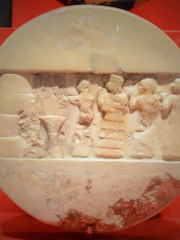

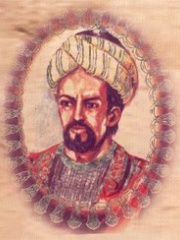

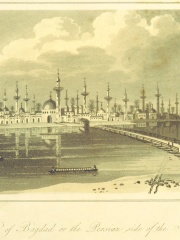
The Most Famous
WRITERS from Iraq
Top 10
The following people are considered by Pantheon to be the top 10 most legendary Iraqi Writers of all time. This list of famous Iraqi Writers is sorted by HPI (Historical Popularity Index), a metric that aggregates information on a biography's online popularity. Visit the rankings page to view the entire list of Iraqi Writers.

1. Al-Masudi (896 - 956)
With an HPI of 78.74, Al-Masudi is the most famous Iraqi Writer. His biography has been translated into 63 different languages on wikipedia.
al-Masʿūdī (full name Abū al-Ḥasan ʿAlī ibn al-Ḥusayn ibn ʿAlī al-Masʿūdī, أبو الحسن علي بن الحسين بن علي المسعودي), c. 896–956, was a historian, geographer and traveler. He is sometimes referred to as the "Herodotus of the Arabs". A polymath and prolific author of over twenty works on theology, history (Islamic and universal), geography, natural science and philosophy, his celebrated magnum opus The Meadows of Gold (Murūj al-Dhahab) combines universal history with scientific geography, social commentary and biography.

2. Fuzûlî (1494 - 1556)
With an HPI of 78.46, Fuzûlî is the 2nd most famous Iraqi Writer. His biography has been translated into 75 different languages.
Muhammad bin Suleyman (Azerbaijani: Məhəmməd Süleyman oğlu, مَحمد سلیمان اوغلی; 1483–1556), better known by his pen name Fuzuli (Füzuli, فضولی), was a 16th-century poet who composed works in his native Azerbaijani, as well as Persian and Arabic. He is regarded as one of the greatest poets of Turkic literature and a prominent figure in both Azerbaijani and Ottoman literature. Fuzuli's work was widely known and admired throughout the Turkic cultural landscape from the 16th to the 19th centuries, with his fame reaching as far as Central Asia and India. Born in 1483 in modern-day Iraq, Fuzuli studied literature, mathematics, astronomy, and languages as a child. During his lifetime, his homeland changed hands between the Aq Qoyunlu, Safavid, and Ottoman states. He composed poetry for officials in all three empires, writing his first known poem to Shah Alvand Mirza of the Aq Qoyunlu. Fuzuli wrote most of his poetry during the Ottoman rule of Iraq, which is why he is also sometimes called an Ottoman poet. Throughout his life, he had several patrons but never found one that fully satisfied him—as he wrote—and his desire to join a royal court was never realised. Despite wishing to see places like Tabriz in modern-day Iran, Anatolia, and India, he never travelled outside Iraq. In 1556, Fuzuli died from the plague and was buried in Karbala. Fuzuli is best known for his Azerbaijani works, especially his ghazals (a form of love poem) and his lyric poem Leylī va Macnūn, which is an interpretation of a Middle Eastern story of tragic love. He also wrote dīvāns (collections of poems) in Azerbaijani, Persian, and possibly Arabic. His style has been described as being distinguished by his "intense expression of feelings" and his use of mystic metaphors and symbols. His poetry shows influences from Persian poets like Nizami, Jami, and Hafez, as well as Azerbaijani poets like Habibi and Nasimi. Fuzuli played a role in the development of the Azerbaijani language, with his writings being described as elevating Azerbaijani poetry and language to new heights. His work has been characterised as a reconciliation of Azerbaijani, Persian, and Arabic literary practices, as well as of Shia and Sunni beliefs. He remains a popular poet in Azerbaijan, Turkey, Iran, and Iraq.

3. Ahmad ibn Hanbal (780 - 855)
With an HPI of 78.16, Ahmad ibn Hanbal is the 3rd most famous Iraqi Writer. His biography has been translated into 69 different languages.
Ahmad ibn Hanbal (Arabic: أحمد ابن حنبل, romanized: Aḥmad ibn Ḥanbal; (164-241 AH; 780 – 855 CE) was an Arab jurist and founder of the Hanbali school who is widely recognized as the scholar who memorized the most Hadiths in Islamic history. One of the most venerated Islamic intellectual figures, ibn Hanbal is notable for his unmatched memorization of over one million prophetic narrations, an unprecedented number that has never been claimed by any other muhaddith. Ibn Hanbal also compiled the largest hadith collection, al-Musnad, which has continued to exercise considerable influence on the field of hadith studies up to the present time, shaping the methodological framework later employed in both Sahih Bukhari and Sahih Muslim. Imam al-Dhahabi described him as “the true Imam, the proof of the religion, the master of hadith, and the leader of the Sunnah”. Imam Ali ibn al-Madini said: “Truly, Allah supported this religion through two men, to whom there is no third: Abu Bakr during the Ridda Wars, and Ahmad ibn Hanbal during the Mihna”. Having studied jurisprudence and hadith under many teachers during his youth, Ibn Hanbal became famous in his later life for the crucial role he played in the Mihna instituted by the Abbasid caliph al-Ma'mun toward the end of his reign, in which the ruler gave official state support to the Mu'tazili doctrine of the Quran being created, a view that contradicted the orthodox position of the Quran being the eternal, uncreated word of God. Living in poverty throughout his lifetime working as a baker, and suffering physical persecution under the caliphs for his unflinching adherence to the traditional doctrine, Ibn Hanbal's fortitude in this particular event only bolstered his "resounding reputation" in the annals of Sunni history. Heralded as one of the mujaddids, Ibn Hanbal later came to be venerated as an exemplary figure in all traditional schools of Sunni thought, both by the exoteric scholars and ascetic Sufis, with the latter often designating him as a saint in their hagiographies. Ibn al-Jawzi relates he "was the foremost in collecting the prophetic way and adhering to it." In the last century, Ibn Hanbal's reputation became subject of debate in certain quarters of the world, as the Hanbali reform movement known as Wahhabism has cited him as a principal influence along with the 13th-century Hanbali reformer Ibn Taymiyya, despite both scholars came much earlier. However, it has been argued by certain scholars that Ibn Hanbal's own beliefs actually played "no real part in the establishment of the central doctrines of Wahhabism," as there is evidence, according to the same authors, "the older Hanbali authorities had doctrinal concerns very different from those of the Wahhabis," due to medieval Hanbali literature being rich in references to saints, grave visitation, miracles, and relics. In this connection, scholars have cited Ibn Hanbal's own support for the use of relics as one of several important points on which the theologian's positions diverged from those adhering to Wahhabism. Other scholars maintain he was "the distant progenitor of Wahhabism", who also immensely inspired the similar conservative reform movement of Salafism.

4. Enheduanna (2300 BC - 2300 BC)
With an HPI of 74.16, Enheduanna is the 4th most famous Iraqi Writer. Her biography has been translated into 60 different languages.
Enheduanna (Sumerian: 𒂗𒃶𒌌𒀭𒈾 Enḫéduanna, also transliterated as Enheduana, En-he2-du7-an-na, or variants; fl. c. 2300 BC) was the entu (high) priestess of the moon god Nanna (Sīn) in the Sumerian city-state of Ur in the reign of her father, Sargon of Akkad (r. c. 2334 – c. 2279 BCE). She was likely appointed by her father as the leader of the religious group at Ur to cement ties between the Akkadian religion of her father and the native Sumerian religion. Enheduanna has been celebrated as the earliest known named author in world history. A number of works in Sumerian literature, such as the Exaltation of Inanna feature her as the first-person narrator, and other works, such as the Sumerian Temple Hymns may identify her as their author. However, there is considerable debate among modern Assyriologists based on linguistic and archaeological grounds as to whether or not she actually wrote or composed any of the rediscovered works that have been attributed to her. Additionally, the only manuscripts of the works attributed to her were written by scribes in the First Babylonian Empire six centuries after she lived, written in a more recent dialect of the Sumerian language than she would have spoken. These scribes may have attributed these works to her as part of the legendary narratives of the dynasty of Sargon of Akkad in later Babylonian traditions. The cultural memory of Enheduanna and the works attributed to her were lost some time after the end of the First Babylonian Empire. Her existence was first rediscovered by modern archaeology in 1927, when Sir Leonard Woolley excavated the Giparu in the ancient city of Ur and found an alabaster disk with her name, association with Sargon of Akkad, and occupation inscribed on the reverse. References to her name were then later discovered in excavated works of Sumerian literature, which initiated investigation into her potential authorship of those works. Enheduanna's archaeological rediscovery has attracted a considerable amount of attention and scholarly debate in modern times related to her potential attribution as the first known named author. She has also received considerable attention in feminism, and the works attributed to her have also been studied as an early progenitor of classical rhetoric. English translations of her works have inspired a number of literary adaptations and representations.

5. Ahmad ibn Fadlan (900 - 960)
With an HPI of 73.87, Ahmad ibn Fadlan is the 5th most famous Iraqi Writer. His biography has been translated into 53 different languages.
Ahmad ibn Fadlan ibn al-Abbas al-Baghdadi (Arabic: أحمد بن فضلان بن العباس بن راشد بن حماد, romanized: Aḥmad ibn Faḍlān ibn al-ʿAbbās al-Baghdādī) or simply known as Ibn Fadlan, was a 10th-century Arab traveler from Baghdad, Abbasid Caliphate, famous for his account of his travels as a member of an embassy of the Abbasid caliph al-Muqtadir to the king of the Volga Bulgars, known as his risāla ("account" or "journal"). His account is most notable for providing a detailed description of the Volga Vikings, including eyewitness accounts of life as part of a trade caravan and witnessing a ship burial. He also notably described the lifestyle of the Oghuz Turks while the Khazars, Cumans, and Pechenegs were still around. Ibn Fadlan's detailed writings have been cited by numerous historians. They have also inspired works of fiction, including Michael Crichton's novel Eaters of the Dead and the novel's subsequent film adaptation The 13th Warrior.

6. Berossus (400 BC - 300 BC)
With an HPI of 70.12, Berossus is the 6th most famous Iraqi Writer. His biography has been translated into 39 different languages.
Berossus () or Berosus (; Ancient Greek: Βηρωσσός, romanized: Bērōssos; possibly derived from Late Babylonian Akkadian: 𒁹𒀭𒂗𒉺𒇻𒋙𒉡, romanized: Bēl-reʾû-šunu, lit. 'Bel is his shepherd') was an early-3rd-century BCE Hellenistic-era Babylonian writer, priest of Bel Marduk, and astronomer who wrote in the Koine Greek language. His original works, including the Babyloniaca (Ancient Greek: Βαβυλωνιακά), are lost, but fragments survive in some quotations, largely in the writings of the fourth-century CE early Christian writer Eusebius. Berossus has recently been identified with Bēl-reʾû-šunu, a high priest of the Esagila Temple in the city of Babylon, as mentioned in a document from 258 BCE.

7. Al-Mutanabbi (915 - 965)
With an HPI of 68.51, Al-Mutanabbi is the 7th most famous Iraqi Writer. His biography has been translated into 34 different languages.
Abū al-Ṭayyib Aḥmad ibn al-Ḥusayn al-Mutanabbī al-Kindī (c. 915 – 965 AD), commonly known as Al-Mutanabbi (Arabic: المتنبّي), was an Abbasid-era Arab poet at the court of the Hamdanid emir Sayf al-Dawla in Aleppo, and for whom he composed 300 folios of poetry. His poetic style earned him great popularity in his time and many of his poems are not only still widely read in today's Arab world but are considered to be proverbial. He started writing poetry when he was nine years old. He is well known for his sharp intelligence and wittiness. Among the topics he discussed were courage, the philosophy of life, and the description of battles. As one of the greatest, most prominent and influential poets in the Arabic language, much of his work has been translated into over 20 languages worldwide. His great talent brought him very close to many leaders of his time, whom he extolled in return for money and gifts. His political ambitions, however, ultimately soured his relations with his patrons and his egomania may have cost him his life when the subjects of some of his verse attacked him.

8. Ibn Sirin (653 - 729)
With an HPI of 67.63, Ibn Sirin is the 8th most famous Iraqi Writer. His biography has been translated into 22 different languages.
Muhammad Ibn Sirin (Arabic: محمد بن سيرين, romanized: Muḥammad Ibn Sirīn) (born in Basra) was a Muslim tabi' as he was a contemporary of Anas ibn Malik. He is claimed by some to have been an interpreter of dreams, though others regard the books to have been falsely attributed to him. Once regarded as the same person as Achmet son of Seirim, this is no longer believed to be true, as shown by Maria Mavroudi.

9. Ibn al-Jawzi (1116 - 1200)
With an HPI of 67.35, Ibn al-Jawzi is the 9th most famous Iraqi Writer. His biography has been translated into 28 different languages.
Abu al-Faraj Jamal al-Din Abd al-Rahman ibn Abi Hasan Ali Al-Jawzi also known as Ibn al-Jawzi (c. 1116 – 16 June 1201) was a Muslim jurisconsult, preacher, orator, heresiographer, traditionist, historian, judge, hagiographer, and philologist who played an instrumental role in propagating the Hanbali school of orthodox Sunni jurisprudence in his native Baghdad during the twelfth-century. During "a life of great intellectual, religious and political activity," Ibn al-Jawzi came to be widely admired by his fellow Hanbalis for the tireless role he played in ensuring that that particular school – historically, the smallest of the four principal Sunni schools of law – enjoy the same level of "prestige" often bestowed by rulers on the Maliki, Shafi'i, and Hanafi rites. Ibn al-Jawzi received a "very thorough education" during his adolescent years, and was fortunate to train under some of that era's most renowned Baghdadi scholars, including Ibn al-Zāg̲h̲ūnī (d. 1133), Abū Bakr al-Dīnawarī (d. 1137–8), Sayyid Razzāq Alī Jīlānī (d. 1208), and Abū Manṣūr al-Jawālīkī (d. 1144–5). Although Ibn al-Jawzi's scholarly career continued to blossom over the next few years, he became most famous during the reign of al-Mustadi (d. 1180), the thirty-third Abbasid caliph, whose support for Hanbalism allowed Ibn al-Jawzi to effectively become "one of the most influential persons" in Baghdad, due to the caliph's approval of Ibn al-Jawzi's public sermonizing to huge crowds in both pastoral and urban areas throughout Baghdad. In the vast majority of the public sermons delivered during al-Mustadi's reign, Ibn al-Jawzi often presented a stanch defense of the prophet Muhammad's example, and vigorously criticized all those whom he considered to be schismatics in the faith. At the same time, Ibn al-Jawzi's reputation as a scholar continued to grow due to the substantial role he played in managing many of the most important universities in the area, as well as on account of the sheer number of works he wrote during this period. As regards the latter point, part of Ibn al-Jawzi's legacy rests on his reputation for having been "one of the most prolific writers" of all time. As scholars have noted, Ibn al-Jawzi's prodigious corpus, "varying in length" as it does, touches upon virtually "all the great disciplines" of classical Islamic study.

10. Ibn Khallikan (1211 - 1282)
With an HPI of 67.09, Ibn Khallikan is the 10th most famous Iraqi Writer. His biography has been translated into 26 different languages.
Aḥmad bin Muḥammad bin Ibrāhīm bin Abū Bakr ibn Khallikān (Arabic: أحمد بن محمد بن إبراهيم بن أبي بكر ابن خلكان; 22 September 1211 – 30 October 1282), better known as Ibn Khallikān, was a renowned Islamic historian who compiled the celebrated biographical encyclopedia of Muslim scholars and important men in Muslim history, Deaths of Eminent Men and the Sons of the Epoch (Arabic: وفيات الأعيان وأنباء أبناء الزمان, romanized: wafayāt al-ʾaʿyān wa-ʾanbāʾ ʾabnāʾ al-zamān). Due to this achievement, he is regarded as the most eminent writer of biographies in Islamic history.
People
Pantheon has 31 people classified as Iraqi writers born between 2300 BC and 1967. Of these 31, 3 (9.68%) of them are still alive today. The most famous living Iraqi writers include Karim Findi, Muhsin al-Ramli, and Yanar Mohammed. The most famous deceased Iraqi writers include Al-Masudi, Fuzûlî, and Ahmad ibn Hanbal. As of April 2024, 1 new Iraqi writers have been added to Pantheon including Yanar Mohammed.
Living Iraqi Writers
Go to all RankingsKarim Findi
1946 - Present
HPI: 66.74
Muhsin al-Ramli
1967 - Present
HPI: 49.61
Yanar Mohammed
1960 - Present
HPI: 46.45
Deceased Iraqi Writers
Go to all RankingsAl-Masudi
896 - 956
HPI: 78.74
Fuzûlî
1494 - 1556
HPI: 78.46
Ahmad ibn Hanbal
780 - 855
HPI: 78.16
Enheduanna
2300 BC - 2300 BC
HPI: 74.16
Ahmad ibn Fadlan
900 - 960
HPI: 73.87
Berossus
400 BC - 300 BC
HPI: 70.12
Al-Mutanabbi
915 - 965
HPI: 68.51
Ibn Sirin
653 - 729
HPI: 67.63
Ibn al-Jawzi
1116 - 1200
HPI: 67.35
Ibn Khallikan
1211 - 1282
HPI: 67.09
Ibn al-Nadim
1000 - 995
HPI: 66.44
Al-Khalil ibn Ahmad al-Farahidi
718 - 790
HPI: 64.98
Newly Added Iraqi Writers (2025)
Go to all RankingsOverlapping Lives
Which Writers were alive at the same time? This visualization shows the lifespans of the 3 most globally memorable Writers since 1700.


